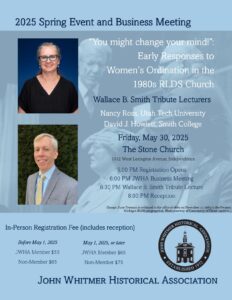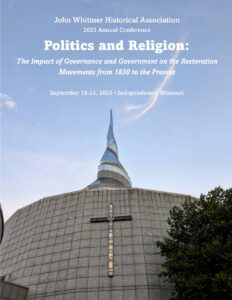Purpose
The John Whitmer Historical Association (JWHA) is dedicated to fostering a scholarly community that is inclusive, respectful, and committed to academic excellence. This Code of Conduct promotes our goal by outlining the core values of JWHA and the conduct we expect of all members of our association, including scholars, staff, students, and volunteers as well as anyone invited to speak at association events, or participate in association activities in any way.
Our Core Values
- Respect: Everyone’s voice matters. We listen to each other with an open mind and respond with kindness and a goal toward understanding regardless of background, beliefs, or viewpoints. It’s okay to disagree but address the data and arguments. Avoid personal attacks, inflammatory language, or contention in person or in writing including in print or online through social media and other formats.
- Inclusive: JWHA welcomes people of all backgrounds and perspectives. We celebrate diversity of thought and are committed to ensuring that everyone feels included. We will not tolerate discrimination, harassment, or bullying.
- Constructive: We encourage healthy discussions and the sharing of ideas. This should be done in a collegial, professional manner. Your words and actions should elevate the academic discourse and create an atmosphere where everyone’s viewpoints are valued.
- Professional: Members and guests who participate in our association are expected to conduct themselves professionally in their academic work and during interaction at our conferences or when representing our association in the public sphere. This includes interaction on social media with the association or its members. Professional behavior includes maintaining confidentiality, respecting intellectual property rights, and acting in a manner commensurate with the other values we embrace.
- Academic Integrity: We are committed to the highest standards of academic integrity. This includes honesty in research, publication, and citation practices. It also includes recognizing the contributions of others in furthering understanding. While we encourage diversity in thought and understanding, we expect scholars who participate in our activities to universally rely on the standards of good academic scholarship, including:
-
- Drawing on reliable historical evidence and the work of experts in the field.
- Avoiding claims or assertions not supported by evidence.
- Avoiding claims of revelation or other access to special knowledge not available to other members of the academic community.
- Engage in respectful dialogue with those with different interpretations, even if expert consensus does not support them.
- Rely on the academic principles of logic, evidence, and reasoned discussion.
- Verify the accuracy of information before it is shared in papers, discussions, or on social media.
What We Expect
- An Environment of Safety: We cannot tolerate words or actions that do not support our core values. Individuals cannot be seen as threatening or creating an environment where other members or participants feel unsafe.
- Consideration of Others: We cannot tolerate any words or actions that are demeaning, intended as personal attacks, or are clearly intended to hurt others emotionally rather than foster discourse and dialogue. Any harassment, discrimination, bullying, or behavior that targets our members or participants in our activities because of their race, gender identity, religion, sexual orientation, or any other personal characteristic outside of the academic sphere is unacceptable.
- Disruptive Behavior: We cannot tolerate any words or actions that interrupt dialogue or presentations without fostering discourse, or that create a hostile environment.
- Support a Positive Environment: Help create an atmosphere where everyone feels safe and valued. If you see something that doesn’t align with these values, let us know.
Reporting Violations
If you experience or witness behavior that violates this Code of Conduct, please contact a member of the JWHA board or the JWHA Executive Committee through the Executive Director at jwha@jwha.info. The committee will investigate the matter and take it to the board to consider appropriate action.
Consequences of Violations
Violations of this Code of Conduct may result in disciplinary action, including:
- Written Warning. A formal written warning may be issued to the member.
- Suspension. The member may be suspended from JWHA activities for a specified period.
- Restrictions on Participation. The member may be restricted from participating in JWHA activities such as Annual Conference or Spring Event.
- Expulsion: In severe cases, or after repeated violations, a member may be expelled from the JWHA. Readmission to membership requires full Board approval.
Conflict or Dispute Resolution
The JWHA is committed to resolving conflicts and disputes fairly, efficiently, and respectfully. Members or other injured parties should strive to resolve disputes directly through communication and compromise. If direct resolution is not possible, the following procedures may be followed:
- Mediation. The JWHA Executive Director may recommend mediation to resolve disputes. Mediation is a voluntary process in which a neutral third party helps the parties involved reach a mutually agreeable solution.
- Formal Complaint. Those wishing to file a formal complaint with the JWHA Executive Committee may do so if mediation is unsuccessful or inappropriate. The Board will investigate the matter and take appropriate action, including disciplinary measures or other remedies.
- Appeal. Individuals dissatisfied with the outcome of a complaint may appeal the decision to the full JWHA Board of Directors.
Additional Considerations
- This Code of Conduct is intended to complement the policies and bylaws of the JWHA.
- Members are encouraged to seek guidance from the JWHA Executive Director if they have questions about the Code of Conduct or its application.



